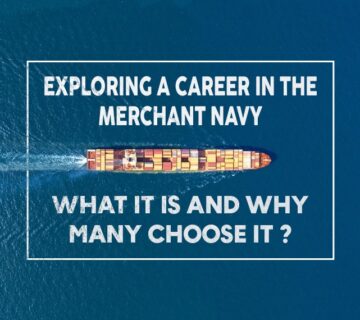Setting sail across vast oceans, embarking on thrilling adventures, and experiencing a world beyond the shorelines—the merchant navy offers a career like no other. The brave, the impassioned, and those with eternal wanderlust are drawn to this line of work. A career in the maritime industry may be for you if you’ve ever imagined a life where the ocean serves as your workplace and the horizon is your constant companion.
But how does one go out on such a remarkable journey? To shed light on the path to a prosperous career in the merchant navy, we are going to go through the channels of knowledge of the Merchant Navy exam, experience, and opportunity in this in-depth blog.
What is The Merchant Navy?
The Merchant Navy is a vital part of global maritime trade. It consists of civilian vessels like cargo ships, tankers, and cruise liners, responsible for transporting goods and commodities worldwide. It offers diverse career opportunities and fosters a multicultural environment where individuals from different backgrounds work together. Life at sea in the Merchant Navy is demanding yet rewarding, providing the chance to explore new countries and contribute to global trade. This all can be achieved by studies to crack the Merchant Navy exam, hard work, and dedication.
Eligibility And Qualifications:
Certain eligibility criteria and qualifications must be met to pursue a career in the Merchant Navy. Here are the key factors to consider:
Educational Requirements:
- Minimum educational qualifications typically include completing 10+2 education with Physics, Chemistry, and Mathematics (PCM) as core subjects. Or else only 10th Pass candidates are also eligible to join. With an core subject of English proficiency.
- Some maritime institutes may have specific academic requirements, so it’s essential to research and fulfill their criteria.
Age Limit:
- Candidates must also be at least 17 and under 28 years old at the time of application.
Physical Fitness:
- Physical fitness is crucial for a career in the Merchant Navy due to the demanding nature of the work.
- Candidates need to meet specific medical and physical standards, including eyesight requirements, hearing ability, and overall health.
- Undergoing medical examinations conducted by approved doctors or institutions is typically part of the selection process.
Maritime Training Institutes:
- Aspiring seafarers are required to undergo pre-sea training programs from recognized maritime training institutes like Training Ship Varren.
- These institutes provide courses that cover various aspects of the merchant navy, including navigation, engineering, and electro-technical fields.
- It’s essential to choose reputable institutes like ours that are approved by the respective countries’ maritime authorities or regulatory bodies.
Certification and Licensing:
- Obtaining the necessary certifications and licenses is crucial for working in the Merchant Navy.
- The International Convention on Standards of Training, Certification, and Watchkeeping for Seafarers (STCW) sets the minimum training, certification, and watchkeeping standards required for seafarers globally.
- Depending on the specific role and rank, seafarers need to acquire certificates such as Certificate of Competency (CoC), Basic Safety Training (BST), Proficiency in Survival Craft and Rescue Boats (PSCRB), Medical First Aid (MFA), and others.
Language Proficiency:
- Proficiency in the English language is vital for communication and understanding international maritime regulations.
- Many maritime institutes require candidates to have a specific English language proficiency level, typically demonstrated through standardized tests like IELTS or TOEFL.
Merchant Navy Career Prospects
The Merchant Navy provides a wide range of job opportunities, including various roles and chances for professional advancement. The Merchant Navy offers a vibrant and fulfilling workplace, regardless of your career goals—whether you want to work on deck, in engineering, or a specialized position.
Deck officers: Deck officers are in charge of the ship’s safe navigation, including cargo operations, vessel handling, and route planning. Deck officers may progress from their initial position as cadets to higher levels like Third Officer, Second Officer, Chief Officer, and ultimately Captain.
Engineers: Engineers operate, maintain, and repair the ship’s machinery and systems. There are many opportunities to move up the ranks and assume more responsibility, from entry-level engineering positions to Chief Engineer.
Ratings: Ratings enhance the vessel’s efficiency by carrying out general shipboard responsibilities. Capable seamen, oilers, fitters, and electricians are a few of these positions. Based on their skills and interests, ratings can pursue specialized roles and earn experience.
ETOs (Electro-Technical Officers): ETOs oversee the electrical and electronic systems onboard and ensure they operate properly. The maritime sector’s need for knowledgeable ETOs is growing as technology progresses, opening up more job prospects.
Catering personnel: Onboard passenger ships and offshore facilities, catering personnel are essential to providing meals, housekeeping, and hospitality services. This includes jobs like cooks, stewards, and employees in the hotel industry.
How’s The Merchant Navy As A Career?
Lucrative Pay: Careers in the Merchant Navy frequently provide competitive income packages and growth potential. It is a financially rewarding career because many roles offer additional benefits, allowances, and a good Merchant Navy salary.
Opportunities for Overseas Travel: Working in the Merchant Navy offers a fantastic opportunity for extensive travel. Seafarers travel the world’s waters as part of their work, stopping in various nations and seeing various cultures. This exposure to diverse environments and individuals gives the career a fascinating new facet.
Professional Growth: The nature of the job in the Merchant Navy poses particular difficulties and calls for a high degree of professionalism. Seafarers frequently encounter unforeseen circumstances and emergencies, which helps them develop resilience, problem-solving techniques, and speedy judgment. Such encounters increase one’s skill set and aid in continual professional development.
Job Security: The demand for shipping and trade worldwide guarantees a stable and secure career in the Merchant Navy. Because of the ongoing demand for moving goods and commodities across continents, qualified workers are in high demand, ensuring job security in the sector.
Wrapping Up
If you find yourself drawn to wearing an epaulet and embarking on this career by outstanding in the Merchant Navy exam, it is crucial to receive the appropriate training and acquire the necessary certificates. Training Ship Varren is a renowned institution that provides comprehensive training programs to prepare individuals for a successful career in the maritime industry. Through our training courses and certifications, aspiring mariners can gain the knowledge, skills, and qualifications required to excel in their chosen fields.





